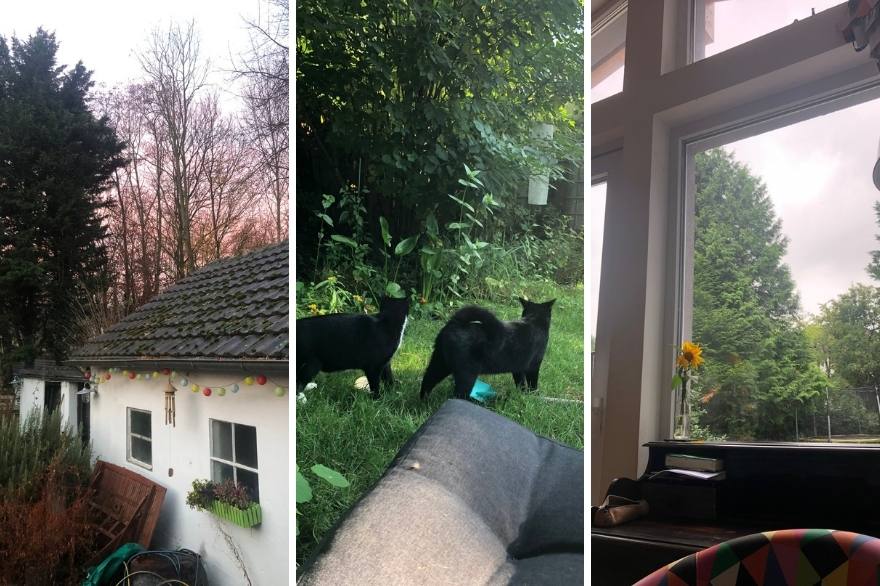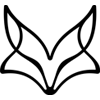Even before there was a company called Wildling Shoes, Melanie was part of the small circle of people who got to see the very first Wildling shoe prototype. That’s how she became an early fan and soon thereafter an early adopter – one of the original Wildling shoes wearers – going on to become one of Wildling Shoes’ first employees. And Melanie’s journey at Wildling Shoes has continued. She began as a copywriter for the Wildling Blogazine and now serves in the role of Diversity Specialist. “I make sure everybody feels at home at Wildling Shoes, no matter what their age, where they’re from, or what they look like.” In this interview, Melanie shares why coffee has played such a major role on her path to Wildling Shoes, and tells us who she can’t be without in her home office.
Your early days at Wildling Shoes: When did you start and what was different at Wildling Shoes back then compared with now?
I began in late 2017, and it feels like almost everything was different then. At that time there were 30 employees; now there are over 250. In those days, most of the employees worked in the Marketing, Customer Service, and Logistics departments. I mainly wrote for the Blogazine, and occasionally also for Facebook, Instagram, or the newsletter. I also went along to trade fairs and helped sell shoes during sales. Today I work in the People & Culture team, which in other companies is often called the Personnel or Human Resources department. Having previously been heavily involved with diversity in my professional life, particularly gender equality, I thought it was great that Wildling Shoes also gave that issue some space and allowed me to play a role in shaping the company. In lieu of applying for a job, I went on a coffee date with Anna during which we shared ideas for content. After that, I was a permanent member of the team.
But what I find far more compelling than what has changed are the things that have remained the same: a predominantly respectful working relationship, the drive to continually reinvent both shoes and work, and the spirit of openness to exploring new things in every area. Because yes, it does seem like a lot of things are changing, and that never ceases. Of course, it’s much more challenging with so many people than with just a few dozen. Adapting to a larger team, more customers, and new options for online collaboration and production is a process of its own.

How would you explain what you do at Wildling Shoes to a ten-year-old kid?
That’s funny, because sometimes my kids think I make shoes or sell them. Also because I took them to a sale once and they ended up helping carry the shoes from the store back to the warehouse. But actually, they (10 and 7 years old) rarely ask what my job is; it’s more like, “What are you doing on the computer all the time?” This digital way of working is still very abstract for kids at that age.
So I would answer, “I make everyone at Wildling Shoes feel at home, no matter how old they are, where they come from, or what they look like. To do that, I write about how everyone wants to be treated, their differing experiences, and above all, I speak a lot with other people within our company and elsewhere about how we can do a better job of making everyone thrive, not just at Wildling Shoes.”
My position is called “Diversity Specialist” and that explanation for 10-year-olds pretty much covers a lot of what I do. I conduct workshops to introduce the topic of diversity and discrimination, as well as more specialized topics like inclusive language. I meet regularly (digitally) with co-workers from various Wildling Shoes teams to consider how we can include all people in our thinking and approach – together with their questions, particularities, strengths, basically with the whole spectrum of their individuality. After all, everyone's an expert on themselves, and my experience of racism as a white person is an entirely different perspective than having someone there who knows from personal experience what racist words or actions feel like.
I seek out ways to collaborate with other experts from outside Wildling Shoes to address areas that we can’t solve by ourselves. We work together with pme Familienservice on the issue of compatibility, for example, and with MyUrbanology in the area of recruiting and diversity, as well as with the tbd* community, so that we can look beyond Wildling Shoes to explore new pathways in the context of diversity and belonging, together with other companies.
Why did you apply to Wildling Shoes?
I knew Anna through a network of self-employed moms before I joined Wildling Shoes. She showed us the Wildling shoe prototype in that group in 2015. I was so taken with the idea and her enthusiasm that I immediately interviewed her for my blog. After that, I followed Wildling Shoes’ progress and became a huge fan myself. I’ve been wearing Wildling shoes ever since the crowdfunding campaign that kicked it all off. Then, two years later, Anna shared a job posting within that network and I reached out to her right away. This led to the aforementioned coffee date. I wanted to be a part of Wildling Shoes because I had a hunch that it was going to be a very special company.
What surprised you the most about Wildling Shoes?
That we grew so big so fast and that it all works. Granted we face some occasional growing pains, but by and large we are doing amazingly well. And that a feeling of community and togetherness usually emerges pretty quickly, both with people I work with on a regular basis and with people I meet less often.
Will you show us a picture of the place where you like to work the most?
The nice thing about working in a team that doesn’t have a fixed location is that you can change your workplace whenever you want. Although each location has its own pros and cons. Before COVID, I really enjoyed working at the community library. Wi-Fi and power were readily available, and whenever I needed a quick break, I could peruse some non-fiction. Sometimes I’d run across something that fit nicely with the piece I was working on, and I’d be able to incorporate that inspiration right into my work. You can’t have meetings in a library, though (“Shhhhh!”), any more than you can at your favorite coffee shop.
I also used to work at our co-working space in Cologne on a regular basis, and I really miss meeting up with my fellow co-workers there and chatting over a cup of coffee. So at the moment I’m mainly based at home, and even though I have a beautiful desk, strangely enough I usually wind up working at the dining table (and then eating more than usual... go figure). Working outside in the yard usually doesn’t go so well, either because the Internet freezes or the sun shines right onto the screen. It was a little easier in my imagination. Anyway, the main thing is that one of my four pets (three cats and a dog) is close by!

What are the things about work that you wouldn’t want to do without?
The flexibility around hours and location, the fact that having children is par for the course and not something you “hide” at work, the fact that I’m viewed not just as an employee, but as a whole person. My wonderful People & Culture colleagues who are always there to share a good laugh and a good cry. The fact that I can help shape Wildling Shoes as a company in so many ways.
What’s your favorite wallpaper?
I don’t use anything like that at all.
What was the best advice you’ve ever received?
At Wildling Shoes or generally? It’s sort of part of my nature to dislike advice in terms of “do this and do that.” But I rarely received that kind of advice at Wildling Shoes. Instead, it was more in the form of “I would do it this way” or “I’ve had good experiences with xy.” But when it comes to classic words of wisdom, I like “You (as a single person) can’t make everybody happy.”
It helps me in my work because you have to bring a lot of people together to understand different perspectives and then try to make everyone “happy” or at least provide an environment where they feel at home. And it helps me personally too, since it is clearly not possible for me, as Melanie, to make everyone around me happy, or even to feel like I have to in the first place.
Wildling Shoes employees from the very beginning
Wildling Shoes wouldn’t be Wildling Shoes without the people who bring values like environmental responsibility, fairness, and the pioneering spirit to life. Today there are around 280 employees – but who were among the first to lay the groundwork in a brand new, tiny start-up team? What was it like to help invent a new way of working back then, what has changed, and how do you manage to retain your own enthusiasm and sense of newness after all these years? In a series of interviews, Wildling Shoes’ earliest employees share their experiences and talk about how they’ve managed to keep their goals and values top of mind over the years as they’ve made their way at Wildling Shoes.
Header image: Sarah Pabst / Wildling Shoes



